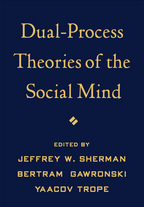Dual-Process Theories of the Social Mind
Edited by Jeffrey W. Sherman, Bertram Gawronski, and Yaacov Trope
1. Two of What?: A Conceptual Analysis of Dual-Process Theories, Bertram Gawronski, Jeffrey W. Sherman, and Yaacov Trope
2. Examining the Mapping Problem in Dual-Process Models, Agnes Moors
3. Conscious and Unconscious: Toward an Integrative Understanding of Human Mental Life and Action, Roy F. Baumeister and John A. Bargh
4. What Is Control?: A Conceptual Analysis, Kentaro Fujita, Yaacov Trope, William A. Cunningham, and Nira Liberman
II. Dual-Systems Models
5. Two Systems of Reasoning: An Update, Steven Sloman
6. Rationality, Intelligence, and the Defining Features of Type 1 and Type 2 Processing, Keith A. Stanovich, Richard F. West, and Maggie E. Toplak
7. The Reflective-Impulsive Model, Fritz Strack and Roland Deutsch
III. Measurement and Formal Modeling
8. Dual-Process Theory from a Process Dissociation Perspective, B. Keith Payne and C. Daryl Cameron
9. Process Models Require Process Measures, Jeffrey W. Sherman, Regina Krieglmeyer, and Jimmy Calanchini
10. Random-Walk and Diffusion Models, Karl Christoph Klauer
IV. Attitudes and Evaluation
11. The MODE Model: Attitude-Behavior Processes as a Function of Motivation and Opportunity, Russell H. Fazio and Michael A. Olson
12. The Elaboration Likelihood and Metacognitive Models of Attitudes: Implications for Prejudice, the Self, and Beyond, Richard E. Petty and Pablo Briñol
13. The Associative-Propositional Evaluation Model: Operating Principles and Operating Conditions of Evaluation, Bertram Gawronski and Galen V. Bodenhausen
14. The Systems of Evaluation Model: A Dual-Systems Approach to Attitudes, Allen R. McConnell and Robert J. Rydell
V. Social Perception
15. Controlled Processing and Automatic Processing in the Formation of Spontaneous Trait Inferences, Randy J. McCarthy and John T. Skowronski
16. The Dynamic Interactive Model of Person Construal: Coordinating Sensory and Social Processes, Jonathan B. Freeman and Nalini Ambady
17. Person Perception: Integrating Category-Level and Individual-Level Information in Face Construal, Kimberly A. Quinn and C. Neil Macrae
18. Dual-Process Models of Trait Judgments of Self and Other: An Overview and Critique, Stanley B. Klein
19. Automaticity, Control, and the Social Brain, Robert P. Spunt and Matthew D. Lieberman
VI. Thinking and Reasoning
20. The Human Unconscious: A Functional Perspective, Ran R. Hassin and Asael Y. Sklar
21. Metacognitive Processes and Subjective Experiences, Rainer Greifeneder and Norbert Schwarz
22. Same or Different?: How Similarity versus Dissimilarity Focus Shapes Social Information Processing, Thomas Mussweiler
23. Visual versus Verbal Thinking and Dual-Process Moral Cognition, Elinor Amit, Sara Gottlieb, and Joshua D. Greene
24. Prolonged Thought: Proposing Type 3 Processing, Ap Dijksterhuis, Madelijn Strick, Maarten W. Bos, and Loran F. Nordgren
VII. Habits, Goals, and Motivation
25. Habits in Dual-Process Models, Wendy Wood, Jennifer S. Labrecque, Pei-Ying Lin, and Dennis Rünger
26. Conscious and Unconscious Goal Pursuit: Similar Functions, Different Processes?, Ruud Custers and Henk Aarts
27. The Implicit Volition Model: The Unconscious Nature of Goal Pursuit, Gordon B. Moskowitz
28. Promotion and Prevention: How "0" Can Create Dual Motivational Forces, E. Tory Higgins
VIII. Self-Regulation and Control
29. Beyond Control versus Automaticity: Psychological Processes Driving Postsuppressional Rebound, Jens Förster and Nira Liberman
30. The Explicit and Implicit Ways of Overcoming Temptation, Ayelet Fishbach and Luxi Shen
31. Breaking the Prejudice Habit: Automaticity and Control in the Context of a Long-Term Goal, Patrick S. Forscher and Patricia G. Devine
32. Emotion Generation and Emotion Regulation: Moving beyond Traditional Dual-Process Accounts, Gal Sheppes and James J. Gross
IX. Criticism and Alternatives
33. The Limits of Automaticity, Klaus Fiedler and Mandy Hütter
34. The Unimodel Unfolding, Arie W. Kruglanski, Kristen M. Klein, Antonio Pierro, and Lucia Mannetti
35. Why a Propositional Single-Process Model of Associative Learning Deserves to Be Defended, Jan De Houwer
36. How Many Processes to Ground a Concept?, Gün R. Semin, Margarida V. Garrido, and Ana Rita Farias
37. Dual Experiences, Multiple Processes: Looking Beyond Dualities for Mechanisms of the Mind, David M. Amodio
38. Rethinking Duality: Criticisms and Ways Forward, Melissa J. Ferguson, Thomas C. Mann, and Michael T. Wojnowicz



